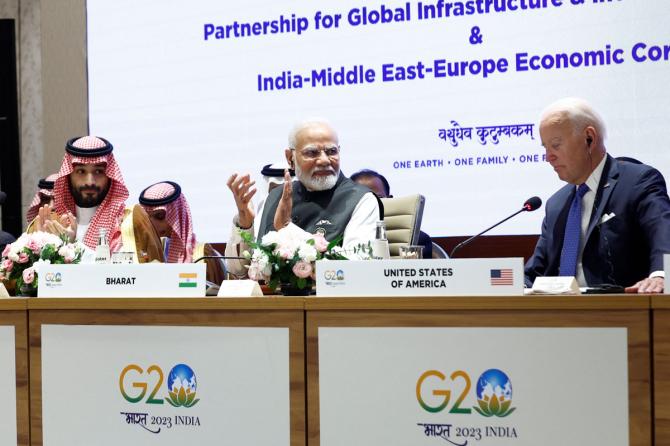NewsApp (Free)
Available on 
India is one of the few countries in the region that enjoys good relations with both Israel and Saudi Arabia, and IMEC would allow it to recreate the old Spice Route to Europe.
All this is in jeopardy now, notes Rajeev Srinivasan.
It can be argued on several grounds that the 2023 Israel-Hamas war is a point of inflection indicating the general eclipse of the West, and in fact I have done so (External Link in an essay.
What is unclear is how the end of this era will play out in the medium term and the long term.
The best analogy I can think of is the assassination of Archduke Ferdinand of Austria by a Serbian nationalist in 1914, and how that set in motion a chain of events that, among other things, ended the European and Ottoman empires over the next forty or fifty years, and more proximately caused the so-called Great War, now re-framed as World War I.
There is the obvious concern that the Israel-Hamas war could set off World War III, especially given that there are many nuclear weapons in the possession of the belligerents and their friends.
Iran has recovered from the debacle of the Stuxnet computer worm that caused their uranium-enrichment centrifuges to blow up (in what was then lauded as an unacknowledged triumph of American and Israeli cloak-and-dagger and technical know-how).
Then there is Pakistan and its rapidly growing arsenal, no doubt helped along by screwdriver assembly of Chinese components, and perhaps knocked-down kits.
Pakistan is one of the most vocal supporters of Palestine as an Ummah cause, which is ironic considering that Pakistani soldiers (and maybe irregulars) seconded to Jordan in 1970 during the Black September uprising may have been responsible for the deaths of thousands of Palestinians.
The specter of an encompassing World War III is sobering, and just as the crumbling League of Nations was unable to fend off earlier editions of world wars, the toothless United Nations is now unlikely to be able to prevent a new one.
It hasn’t been able to prevent all the smaller conflicts, such as the Ukraine war, and it is obvious that major powers simply don’t care about the UN’s exertions and bloviations.
Therefore, one of the biggest fears is that the Hamas attack might seed a larger conflagration.
Of immediate concern, though, is that a nascent process of normalisation in West Asia may now grind to a halt. This can have global consequences. It is likely that the earlier edition of the Arab-Israeli conflict, the Yom Kippur War of 1973, led directly to the Arab oil embargo followed by the shock of their quadruplication of oil prices.
This caused inflation in the US, but more seriously, it precipitated a massive transfer of wealth from developing countries, which set them back by decades, compounding human misery.
There are thus unforeseen consequences to what happens in West Asia, which, barring some miracle, will continue to dominate energy supplies for the next couple of decades, even if the most optimistic Green initiatives come to fruition.
Things are obviously different from 1973, with West Asians (especially Saudi Arabia) much more self-confident, immensely richer, and also cognisant of the fact that their oil/gas bonanzas will run out sooner or later. They need to diversify their economies, and possibly make some new friends, other than those who are dazzled by their petro-dollars.
It is this realisation that led to the landmark Abraham Accords, whereby several Arab nations normalised their relations with Israel.
The general expectation has been that Saudi Arabia would follow suit, and Mohammed bin Salman has been signaling that he is willing to do this (but also, in his own national interest, willing to embrace China and the proposed BRICS+ currency, both of which would be setbacks for the US and the collective West).
The biggest geopolitical casualty of the Hamas war is that this normalisation will be put on hold.
Saudi Arabia simply cannot appear to be mindless of the plight of the largely Muslim Palestinians, even if they are nervous about the decidedly fundamentalist Hamas, who, in an interesting twist, may well be aligning themselves with Shia Iran, the principal regional foe of the Sunni Saudis.
However, what is also worth noting is that the Saudis, as well as Egyptians and other Arabs, are all reluctant to resettle Palestinians in their largely empty, and rich, countries.
There might be two reasons for this: One, perhaps it is still the ambition of the Arab States to eliminate Israel and wipe it off the map altogether (which is what they, and Iran, proclaimed loudly in the past, although it is not clear this is actually feasible any more).
If so, maintaining Palestinians as an aggrieved quasi-nation, which would supply an endless stream of militants to the Hamases and Hezbollahs of the region, is a viable, if brutal, strategy.
Two, Arab States may not actually want Palestinians as refugees because they might cause all sorts of domestic problems. This always puzzled me, because on average the Palestinians of 1948 were much better educated than most other Arabs, and could have contributed to other Arab nations.
My conjecture is that, given the examples of Pakistani migrants in Britain, and more recent Syrian etc refugees in Europe — easily radicalised and prone to blood-curdling rhetoric and possibly action against their host nations — Arab States want to keep them out.
This could be the real reason Egypt refuses to open the border for the fleeing residents of Gaza…
It is a bit like the Rohingya of Myanmar. They have a reputation for being troublesome radical Islamists, and so nobody wants to take them in: Not Bangladesh where they originally hail from, not any Arab States, not Pakistan (although some Westerners suggested (External Link) that India and China should take them. China laughed in their faces, but India dutifully did so).
Given all this, and the growing clout of Israel under the American security umbrella, chances are that the Palestinian cause would have become increasingly less relevant to Saudis and other Arabs. And that is precisely what might have motivated Hamas and friends: With the emergent normalisation of ties with Israel in the region, and initiatives like i2u2 (Israel, India, US, UAE) and IMEC (India Middle East Europe Corridor), there would be commercial and trade ties that would bind.
After all, a major part of these trade corridors would be the infrastructure links (railway lines through Saudi Arabia, the Israeli port of Haifa) that would offer alternative trade routes to Europe from India and Southeast Asia. This would offend China too, because its grand Belt and Road Initiative and trans-European railway links would see less business.
Thus, in passing, China also is a winner in this Great Game as West Asia goes on the boil, along with usual suspects Iran, Qatar and Turkey.
Thus, from several points of view, this Hamas war is an immediate setback to India: It is one of the few countries in the region that enjoys good relations with both Israel and Saudi Arabia, and IMEC would allow it to recreate the old Spice Route to Europe, which was highly lucrative over millennia.
All this is in jeopardy now. The strategic and under-construction Vizhinjam container transhipment port in Thiruvananthapuram is a key part of this ambitious trade route.
India also has interests in Iran: The Chabahar port could enable India to create an alternative route to Central Asia and Russia called the INSTC bypassing trouble-prone Pakistan and Afghanistan (International North South Transport Corridor (although that long-pending logistics link is years behind schedule). India cannot allow its relations with Iran to be affected by the war in Gaza.
More broadly, if world trade collapses and/or a war begins now it would be unfortunate timing for India. This is the very moment India is ready to finally leave behind the bitter legacy of colonialism, which looted enormous wealth from India (I have argued it was $10 trillion, but economist Utsa Patnaik puts the figure at $45 trillion).
A collapse in the procedures of the ‘liberal, rules-based international order’, however biased it is in favor of the West, is unfortunate for India in the medium term, although it would probably be fine in the longer term.
There are two other aspects of the response to Gaza that are notable. The first is the rise of ugly anti-Jewish sentiments in many parts of the West. This is of concern to Indians, specifically Hindus, because Hindu-hatred is anti-semitism 2.0 and Hindus cannot wish it away.
On the other hand, the Left was startled by the swift reaction from American Jews to standard Left positioning of moral equivalence between Hamas and the Israeli Defense Forces. For instance, several Harvard student groups released statements about their support for Palestine and/or Hamas, which probably was seeded by Pakistani and, alas, woke Indian-origin students in their ranks.
Retribution was swift: Bill Ackman, a billionaire hedge-fund manager, in effect asked fellow CEOs to blacklist these students. There was swift backpedaling as many students worried about their job prospects, protested that the statements were made without consulting them.
This is positive. The Woke Left in the US is splintering. That may mean the Democratic party tactic of uber-wokeism may now backfire on them, especially notable as elections are looming in the US. The less the wokeism around, the better for India (see Justin Trudeau’s Khalistan antics).
The weakening of Western power and resolve vis a vis China is another problem for India. The West simply cannot supply munitions for multiple wars (Ukraine, Gaza, and possibly Taiwan), partly because the US has been deindustrialised.
What we might see in the medium term is the deprecation of US power in the Indo-Pacific, and indeed a fallback to isolationism and Fortress America. This would encourage a China that is just waiting to rampage.
The current Israel-Hamas war is a net negative for India; the issue of Western Hindu-hatred is a topic for another day.
News India | Latest News India | Bollywood News | Indian Cricket Score | India Business News
